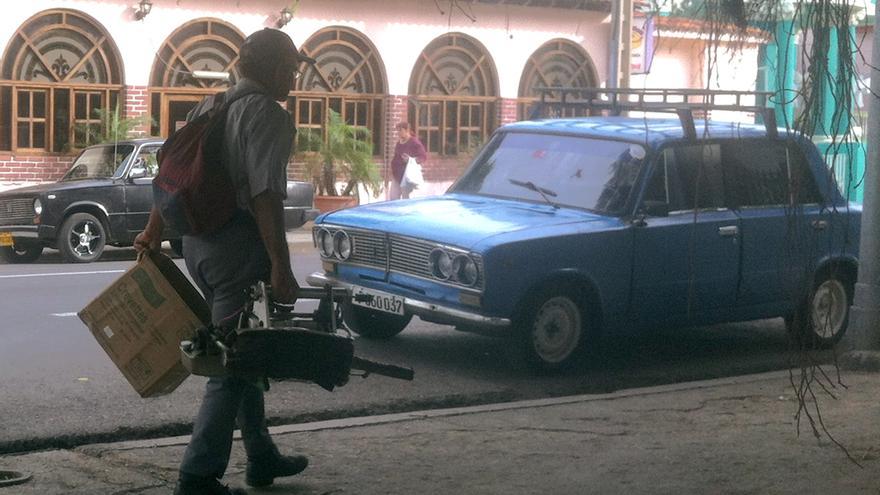
![]() 14ymedio, Havana, 20 September 2022 — The risk of getting sick from dengue fever is high throughout the country. This comes from the Minister of Public Health, José Ángel Portal Miranda, who signed a statement released this Monday by his department to warn of the worrying situation.
14ymedio, Havana, 20 September 2022 — The risk of getting sick from dengue fever is high throughout the country. This comes from the Minister of Public Health, José Ángel Portal Miranda, who signed a statement released this Monday by his department to warn of the worrying situation.
“The rates of infestation caused by Aedes Aegypti, the [mosquito] transmitting agent of dengue, continue to be high in Cuba. Even though in the last five weeks there has been a decrease in the rate of transmission of the virus — with very similar figures — the risk of getting sick is high throughout the country,” says the minister, who is also a doctor, without giving any of those figures that allow a full understating of the extent of the situation.
Ten days ago, health authorities went on the State TV Roundtable television program in order to provide extensive information, they said, on the evolution of the virus, but they refused to detail once again how many cases there are currently on the Island and limited themselves to pointing out that the situation is similar to that of Latin America, which has reported an increase of 300% in the first 32 weeks of the year, and of 165% in comparison with all of 2021.
Since the number of infections in that year is not known either, it’s impossible to know the real dimension of the problem, although the number of known patients is a warning symptom.
In addition, the authorities specified that 60% of the cases are of type 3, the most serious, although the four variants of the disease currently coexist.
According to Portal Miranda, Santiago de Cuba, Havana, Guantánamo, Las Tunas, Matanzas, Mayabeque and Isla de la Juventud are the provinces with the highest incidence rates of the disease, although, once again, the rate is unknown.
The minister places the beginning of the “current cycle of focal treatment” on September 5, at which time the greatest presence of mosquitoes was detected in Santiago de Cuba, Havana, Camagüey, Holguín, Matanzas, Villa Clara and Pinar del Río, with water tanks, once again, as the main place of concentration of the Aedes Aegypti mosquito.
Portal Miranda adds that in 43.1% of the blocks in which the presence of the mosquito was detected, the problem persists, and that although the rate of growth is contained, “it’s still impossible to stop the transmission or increase in the incidence rate of suspected cases” of the disease.
The minister’s message is addressed to the population to become aware and avoid contagion or worsening in the case of getting sick. “We cannot leave that responsibility alone to the workers of the vector campaign,” says Portal Miranda.
The official reminds people of the symptoms and also insists that they don’t have to wait for bleeding to take action, because sometimes abdominal pain, vomiting, fluid accumulation, bleeding from the mucosa, irritability, drowsiness or fainting are already a warning that the disease is entering a critical phase.”
One of the problems faced by the Ministry of Public Health in the face of the spread of dengue is the lack of diagnostic methods, which is why Portal Miranda indicates in his statement that action be taken even without the appropriate confirmation. “The first thing we should always think about in any of these symptoms is dengue, until the opposite is proven,” he said, immediately warning of the dangers of a delay.
The problems in obtaining diagnoses, medicines and good hospital care are a blow in the face of the current epidemic. Many Cubans refuse to be admitted due to the poor condition of the facilities and prefer to stay at home, potentially multiplying the chances of contagion.
The difficulties in carrying out the campaign against dengue have been another factor that have contributed to the worsening of the situation this year. The lack of workers and, above all, material and fuel to fumigate have been the norm, to the point that the Deputy Minister of Health, Carilda Peña García, warned last week that the blame this time fell to the Government. “[The population] has worked to eliminate the foci of the vector in their homes. We know that we have responsibility for the issue and that it didn’t go as it should have,” he said, although there are many people who are reluctant to fumigate their homes.
The authorities have also acknowledged that dengue is causing deaths in Cuba, but they haven’t dared to give a figure. Just last week, two health workers died from virus.
Translated by Regina Anavy
____________
COLLABORATE WITH OUR WORK: The 14ymedio team is committed to practicing serious journalism that reflects Cuba’s reality in all its depth. Thank you for joining us on this long journey. We invite you to continue supporting us by becoming a member of 14ymedio now. Together we can continue transforming journalism in Cuba.
